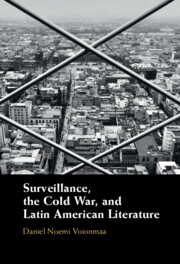Book contents
- Surveillance, the Cold War, and Latin American Literature
- Surveillance, the Cold War, and Latin American Literature
- Copyright page
- Dedication
- Contents
- Figures
- Preface
- Acknowledgments
- Chapter 1 Seeing It All
- Chapter 2 Latin American Archives and Human Matter
- Chapter 3 Cultural Cold War
- Chapter 4 Spying and Knowledge
- Chapter 5 Reading Like a Spy
- Chapter 6 Writing Like a Spy
- Chapter 7 Spying Like a Writer
- Conclusion
- Notes
- Bibliography
- Index
Chapter 7 - Spying Like a Writer
Gabriel García Márquez, José Revueltas, Otto René Castillo, and Mario Payeras
Published online by Cambridge University Press: 18 August 2022
- Surveillance, the Cold War, and Latin American Literature
- Surveillance, the Cold War, and Latin American Literature
- Copyright page
- Dedication
- Contents
- Figures
- Preface
- Acknowledgments
- Chapter 1 Seeing It All
- Chapter 2 Latin American Archives and Human Matter
- Chapter 3 Cultural Cold War
- Chapter 4 Spying and Knowledge
- Chapter 5 Reading Like a Spy
- Chapter 6 Writing Like a Spy
- Chapter 7 Spying Like a Writer
- Conclusion
- Notes
- Bibliography
- Index
Summary
Chapter 7 reverses the perspective of the previous two chapters and reads several literary works to unearth their dialogue with the State’s surveillance. It begins with the analysis of García Márquez’s The Autumn of the Patriarch, emphasizing the role played by poetry in the novel and how it confronts hegemonic power. It then discusses the short story “The Most Handsomest Drowned Man in the World” and the ambiguity of the sense of liberation in its ending. The chapter then turns to two works by José Revueltas: the short story “Hegel and I,” which deals with the possibilities and limits of knowledge; and the novel “Errors,” which criticizes of the the Mexican Communist Party. The chapter continues with the analysis of several poems by Guatemalan writer and guerrillero Otto René Castillo, focusing on the relation between praxis and theory that all intellectual faces, and the importance of the lover’s gaze in the poetic construction of a new reality. Lastly, it examines the autobiographical text Thunder in the City, written by Mario Payeras . The author evokes his time in the urban guerrilla in the early 1980s in Guatemala City and provides a remarkable view into the State’s surveillance.
Keywords
- Type
- Chapter
- Information
- Surveillance, the Cold War, and Latin American Literature , pp. 146 - 177Publisher: Cambridge University PressPrint publication year: 2022

